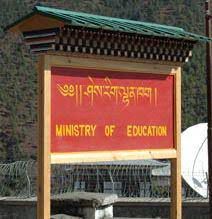This comes after the government’s decision to absorb all class X graduates in public schools by 2022
Though the government has decided to absorb all class X “pass” students in public schools by 2022 and distribute 1,500 students to the private schools on a government scholarship for this year’s academic session, some parents still want to send their children to private schools.
They feel that private schools have a better learning environment, English being the medium of instruction in private schools, and the quality of education being “unsatisfactory” in government schools.
A parent in Thimphu said that the problem of quality in public schools seems to be more acute at the school level. She said her two children are studying at Ugyen Academy in Punakha.
“The majority, however, turn to private educational providers because of the absence of a government institution in the vicinity, or inability to get admission into one,” she added.
She pays around Nu 95,000 per year for each child but she is not worried about fees because of the quality of education that the school provides. “It is the parents who choose private schools for their children as they believe private schools can offer better all-round education,” she said.
Another parent wanted her young child to study in a private school because of the discipline maintained in the school. “Punctuality, hygiene, and discipline—these are the three soft skills parents look at while getting their children admitted in elementary school,” she said.
Besides that, it is of course the lure of the English language. In a lot of government schools, children are taught in their regional languages and parents know that even a little knowledge of English can go a long way for their children in the future, she added.
Some parents shared that private schools are known to have higher attendance levels of teachers and are known to be less discriminatory. “In public schools, attendance levels are affected as priorities are split,” said one. Some also underlined the importance of measuring learning outcomes regularly to improve the accountability of teachers in public schools.
Public schools are also faced with problems of a class size where at least one class has more than 30-40 students.
Some claim that the government is not even following the student-teacher ratio with the quality of education being unsatisfactory in government schools. “Not to mention the higher social statement that a private school makes,” said one parent, “If I am of high status, I must send (my child) to private school.”
At the same time, teachers at higher levels in government colleges are paid more and the quality of education is considered to be better in these institutions compared to their private counterparts. “Attracting teachers with similar qualifications or teaching experience would make it a lot costlier for a private college,” a parent said.
Meanwhile, some parents send their children to fee-charging schools thinking they will get an English-medium education.
“It is a well-established fact that the household and other characteristics of private school children are very different from those of public school children,” said another parent Dorji Khundu, who has a son studying in Druk School in class XI. “Since learning levels depend not only on the characteristics of a child’s school but also on their own characteristics and those of their household, attribution of all the observed differences in learning levels to differences in schools is incorrect.”
Dorji Khundu shared that in fact, one can go a step further. “In a society where the rich confine themselves to private schools, it would take more than money to improve the quality of education in public schools.”
“I wish to have one of my sons admitted as one of the 1,500 students whom the government is targeting to send to private schools this year,” he added.
He added that a private school provides quality education. “If we look at the quality, out of 59 schools including government, most private schools were credited as top-performing schools by Education Monitoring Division under the Ministry of Education.”
He said that government schools are overcrowded: while each class should ideally have a maximum of 32 students, there are around 50 in government schools. In addition, government schools do not have enough teachers, and teachers are under huge pressure, he said.
According to the education ministry, there are 61 public schools and 36 private schools. Education Statistics 2020 reveals that there are 9,525 students in Higher Secondary Schools and around 556 in Middle Secondary Schools. There are 21 private schools in Bhutan with classes XI-XII, from a total of 36 private schools.
Last year, private schools saw around 2,068 students on scholarship and the ministry has tentatively targeted to distribute 1,500 students to the private schools on a government scholarship for this year’s academic session. The schools would have to divide the 1,500 students.
Education Secretary Dasho Karma Tshering said that taking into account the criticism that the quality of education is “unsatisfactory” in government schools, the new reforms in education will prioritize the up-gradation of quality.
“The teacher-student ratio should be maintained for good quality education,” he said, adding that with new reforms the curriculums of the public schools will also change to make way for better quality education.
Meanwhile, the ministry is working to create an education reform team that plans to unfold activities and strategic documents that will look at reforming education.
Dasho Karma Tshering said that till now, teachers spoon-fed students and spent less on providing students a sense of direction, skills needed for the future, leadership, creativity, critical thinking, and social skills, which led to the decline in quality education.
Kinley Yonten from Thimphu












